Report on Elon Musk: An International Technology Entrepreneur
VerifiedAdded on 2023/06/17
|9
|2119
|338
Report
AI Summary
This report provides a comprehensive analysis of Elon Musk as an international entrepreneur, examining his motivations, ventures, and application of relevant theories. The report begins with an overview of international entrepreneurship and delves into the factors motivating Musk, such as familial influences, education, and inherent traits. It applies effectuation theories, highlighting Musk's use of his expertise, knowledge, and networks. Lessons are drawn from Musk's success, emphasizing the importance of education, family support, and industry knowledge. The report then focuses on technology entrepreneurship as a central theme, discussing its features and current debates, particularly concerning consumer privacy and ethical considerations. The analysis concludes that while technology entrepreneurship is vital for innovation, it also raises ethical concerns that need careful consideration. Desklib offers similar solved assignments and past papers for students.
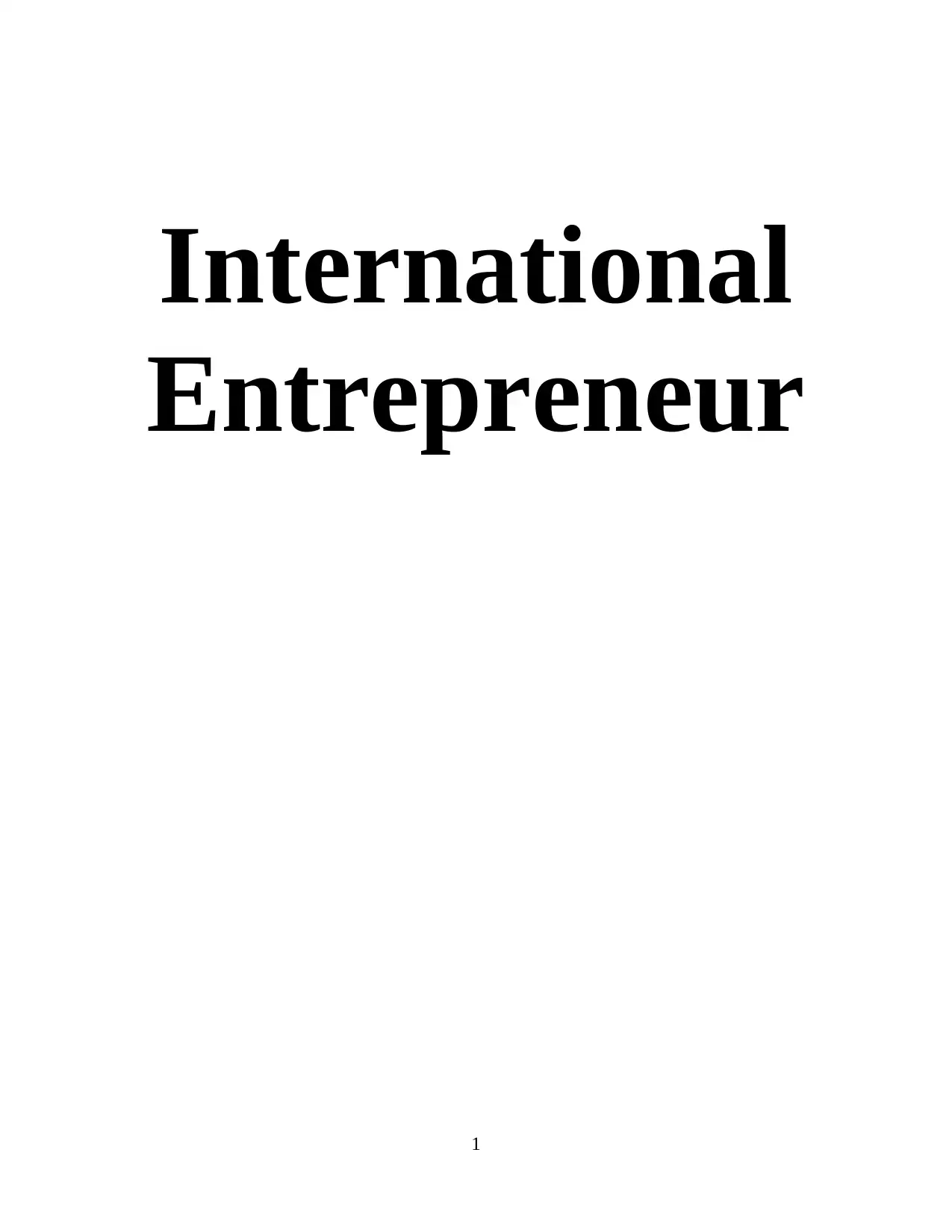
International
Entrepreneur
1
Entrepreneur
1
Paraphrase This Document
Need a fresh take? Get an instant paraphrase of this document with our AI Paraphraser

2
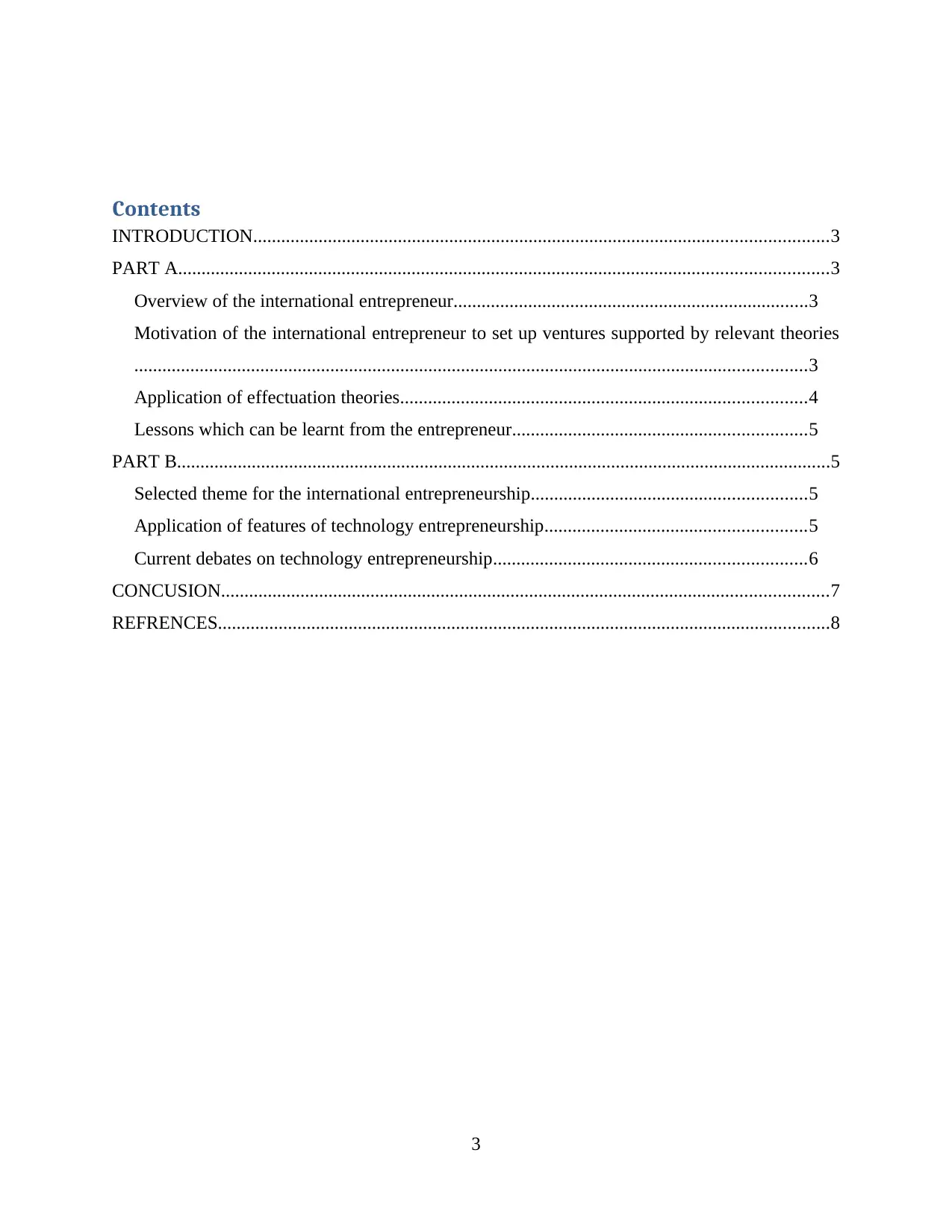
Contents
INTRODUCTION...........................................................................................................................3
PART A...........................................................................................................................................3
Overview of the international entrepreneur............................................................................3
Motivation of the international entrepreneur to set up ventures supported by relevant theories
................................................................................................................................................3
Application of effectuation theories.......................................................................................4
Lessons which can be learnt from the entrepreneur...............................................................5
PART B............................................................................................................................................5
Selected theme for the international entrepreneurship...........................................................5
Application of features of technology entrepreneurship........................................................5
Current debates on technology entrepreneurship...................................................................6
CONCUSION..................................................................................................................................7
REFRENCES...................................................................................................................................8
3
INTRODUCTION...........................................................................................................................3
PART A...........................................................................................................................................3
Overview of the international entrepreneur............................................................................3
Motivation of the international entrepreneur to set up ventures supported by relevant theories
................................................................................................................................................3
Application of effectuation theories.......................................................................................4
Lessons which can be learnt from the entrepreneur...............................................................5
PART B............................................................................................................................................5
Selected theme for the international entrepreneurship...........................................................5
Application of features of technology entrepreneurship........................................................5
Current debates on technology entrepreneurship...................................................................6
CONCUSION..................................................................................................................................7
REFRENCES...................................................................................................................................8
3
⊘ This is a preview!⊘
Do you want full access?
Subscribe today to unlock all pages.

Trusted by 1+ million students worldwide
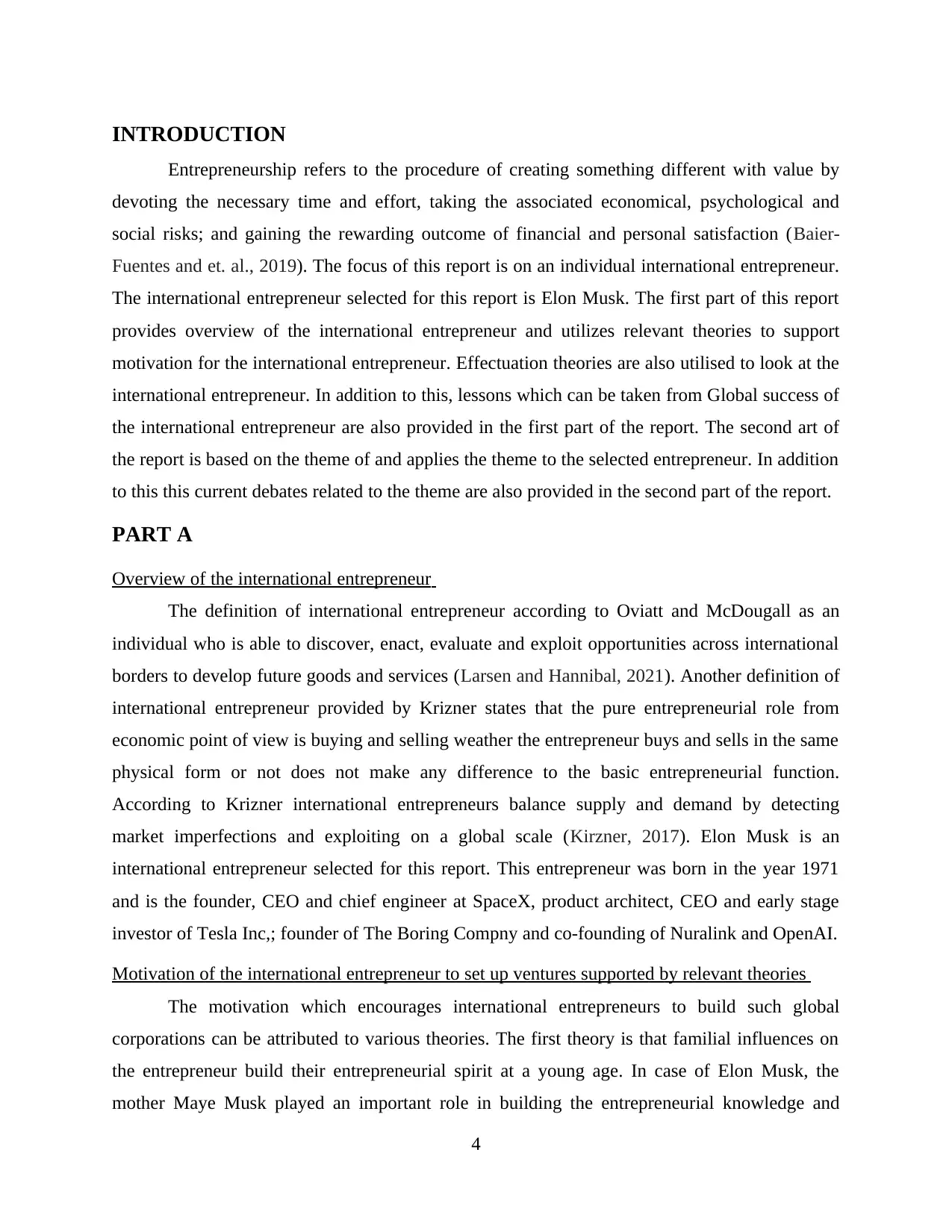
INTRODUCTION
Entrepreneurship refers to the procedure of creating something different with value by
devoting the necessary time and effort, taking the associated economical, psychological and
social risks; and gaining the rewarding outcome of financial and personal satisfaction (Baier-
Fuentes and et. al., 2019). The focus of this report is on an individual international entrepreneur.
The international entrepreneur selected for this report is Elon Musk. The first part of this report
provides overview of the international entrepreneur and utilizes relevant theories to support
motivation for the international entrepreneur. Effectuation theories are also utilised to look at the
international entrepreneur. In addition to this, lessons which can be taken from Global success of
the international entrepreneur are also provided in the first part of the report. The second art of
the report is based on the theme of and applies the theme to the selected entrepreneur. In addition
to this this current debates related to the theme are also provided in the second part of the report.
PART A
Overview of the international entrepreneur
The definition of international entrepreneur according to Oviatt and McDougall as an
individual who is able to discover, enact, evaluate and exploit opportunities across international
borders to develop future goods and services (Larsen and Hannibal, 2021). Another definition of
international entrepreneur provided by Krizner states that the pure entrepreneurial role from
economic point of view is buying and selling weather the entrepreneur buys and sells in the same
physical form or not does not make any difference to the basic entrepreneurial function.
According to Krizner international entrepreneurs balance supply and demand by detecting
market imperfections and exploiting on a global scale (Kirzner, 2017). Elon Musk is an
international entrepreneur selected for this report. This entrepreneur was born in the year 1971
and is the founder, CEO and chief engineer at SpaceX, product architect, CEO and early stage
investor of Tesla Inc,; founder of The Boring Compny and co-founding of Nuralink and OpenAI.
Motivation of the international entrepreneur to set up ventures supported by relevant theories
The motivation which encourages international entrepreneurs to build such global
corporations can be attributed to various theories. The first theory is that familial influences on
the entrepreneur build their entrepreneurial spirit at a young age. In case of Elon Musk, the
mother Maye Musk played an important role in building the entrepreneurial knowledge and
4
Entrepreneurship refers to the procedure of creating something different with value by
devoting the necessary time and effort, taking the associated economical, psychological and
social risks; and gaining the rewarding outcome of financial and personal satisfaction (Baier-
Fuentes and et. al., 2019). The focus of this report is on an individual international entrepreneur.
The international entrepreneur selected for this report is Elon Musk. The first part of this report
provides overview of the international entrepreneur and utilizes relevant theories to support
motivation for the international entrepreneur. Effectuation theories are also utilised to look at the
international entrepreneur. In addition to this, lessons which can be taken from Global success of
the international entrepreneur are also provided in the first part of the report. The second art of
the report is based on the theme of and applies the theme to the selected entrepreneur. In addition
to this this current debates related to the theme are also provided in the second part of the report.
PART A
Overview of the international entrepreneur
The definition of international entrepreneur according to Oviatt and McDougall as an
individual who is able to discover, enact, evaluate and exploit opportunities across international
borders to develop future goods and services (Larsen and Hannibal, 2021). Another definition of
international entrepreneur provided by Krizner states that the pure entrepreneurial role from
economic point of view is buying and selling weather the entrepreneur buys and sells in the same
physical form or not does not make any difference to the basic entrepreneurial function.
According to Krizner international entrepreneurs balance supply and demand by detecting
market imperfections and exploiting on a global scale (Kirzner, 2017). Elon Musk is an
international entrepreneur selected for this report. This entrepreneur was born in the year 1971
and is the founder, CEO and chief engineer at SpaceX, product architect, CEO and early stage
investor of Tesla Inc,; founder of The Boring Compny and co-founding of Nuralink and OpenAI.
Motivation of the international entrepreneur to set up ventures supported by relevant theories
The motivation which encourages international entrepreneurs to build such global
corporations can be attributed to various theories. The first theory is that familial influences on
the entrepreneur build their entrepreneurial spirit at a young age. In case of Elon Musk, the
mother Maye Musk played an important role in building the entrepreneurial knowledge and
4
Paraphrase This Document
Need a fresh take? Get an instant paraphrase of this document with our AI Paraphraser
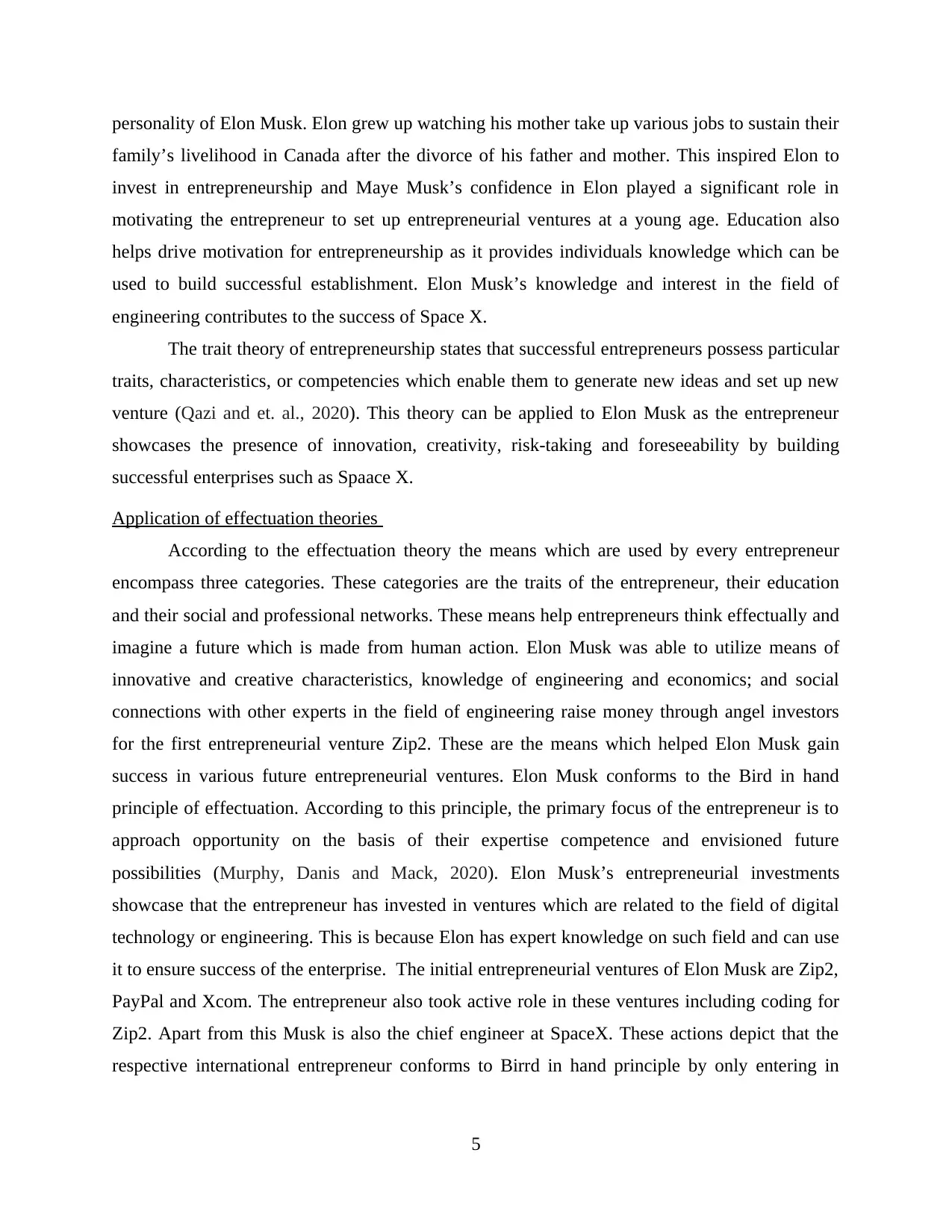
personality of Elon Musk. Elon grew up watching his mother take up various jobs to sustain their
family’s livelihood in Canada after the divorce of his father and mother. This inspired Elon to
invest in entrepreneurship and Maye Musk’s confidence in Elon played a significant role in
motivating the entrepreneur to set up entrepreneurial ventures at a young age. Education also
helps drive motivation for entrepreneurship as it provides individuals knowledge which can be
used to build successful establishment. Elon Musk’s knowledge and interest in the field of
engineering contributes to the success of Space X.
The trait theory of entrepreneurship states that successful entrepreneurs possess particular
traits, characteristics, or competencies which enable them to generate new ideas and set up new
venture (Qazi and et. al., 2020). This theory can be applied to Elon Musk as the entrepreneur
showcases the presence of innovation, creativity, risk-taking and foreseeability by building
successful enterprises such as Spaace X.
Application of effectuation theories
According to the effectuation theory the means which are used by every entrepreneur
encompass three categories. These categories are the traits of the entrepreneur, their education
and their social and professional networks. These means help entrepreneurs think effectually and
imagine a future which is made from human action. Elon Musk was able to utilize means of
innovative and creative characteristics, knowledge of engineering and economics; and social
connections with other experts in the field of engineering raise money through angel investors
for the first entrepreneurial venture Zip2. These are the means which helped Elon Musk gain
success in various future entrepreneurial ventures. Elon Musk conforms to the Bird in hand
principle of effectuation. According to this principle, the primary focus of the entrepreneur is to
approach opportunity on the basis of their expertise competence and envisioned future
possibilities (Murphy, Danis and Mack, 2020). Elon Musk’s entrepreneurial investments
showcase that the entrepreneur has invested in ventures which are related to the field of digital
technology or engineering. This is because Elon has expert knowledge on such field and can use
it to ensure success of the enterprise. The initial entrepreneurial ventures of Elon Musk are Zip2,
PayPal and Xcom. The entrepreneur also took active role in these ventures including coding for
Zip2. Apart from this Musk is also the chief engineer at SpaceX. These actions depict that the
respective international entrepreneur conforms to Birrd in hand principle by only entering in
5
family’s livelihood in Canada after the divorce of his father and mother. This inspired Elon to
invest in entrepreneurship and Maye Musk’s confidence in Elon played a significant role in
motivating the entrepreneur to set up entrepreneurial ventures at a young age. Education also
helps drive motivation for entrepreneurship as it provides individuals knowledge which can be
used to build successful establishment. Elon Musk’s knowledge and interest in the field of
engineering contributes to the success of Space X.
The trait theory of entrepreneurship states that successful entrepreneurs possess particular
traits, characteristics, or competencies which enable them to generate new ideas and set up new
venture (Qazi and et. al., 2020). This theory can be applied to Elon Musk as the entrepreneur
showcases the presence of innovation, creativity, risk-taking and foreseeability by building
successful enterprises such as Spaace X.
Application of effectuation theories
According to the effectuation theory the means which are used by every entrepreneur
encompass three categories. These categories are the traits of the entrepreneur, their education
and their social and professional networks. These means help entrepreneurs think effectually and
imagine a future which is made from human action. Elon Musk was able to utilize means of
innovative and creative characteristics, knowledge of engineering and economics; and social
connections with other experts in the field of engineering raise money through angel investors
for the first entrepreneurial venture Zip2. These are the means which helped Elon Musk gain
success in various future entrepreneurial ventures. Elon Musk conforms to the Bird in hand
principle of effectuation. According to this principle, the primary focus of the entrepreneur is to
approach opportunity on the basis of their expertise competence and envisioned future
possibilities (Murphy, Danis and Mack, 2020). Elon Musk’s entrepreneurial investments
showcase that the entrepreneur has invested in ventures which are related to the field of digital
technology or engineering. This is because Elon has expert knowledge on such field and can use
it to ensure success of the enterprise. The initial entrepreneurial ventures of Elon Musk are Zip2,
PayPal and Xcom. The entrepreneur also took active role in these ventures including coding for
Zip2. Apart from this Musk is also the chief engineer at SpaceX. These actions depict that the
respective international entrepreneur conforms to Birrd in hand principle by only entering in
5
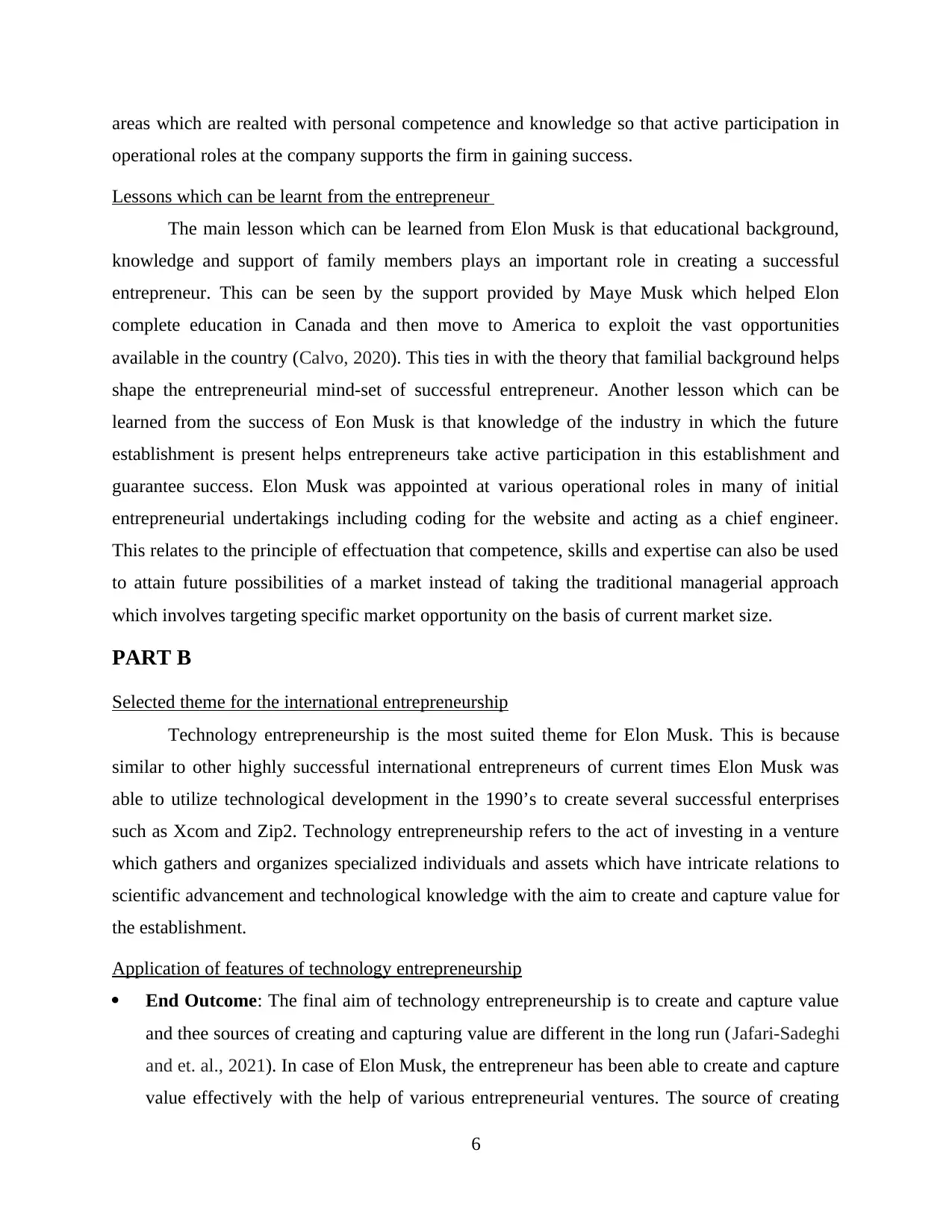
areas which are realted with personal competence and knowledge so that active participation in
operational roles at the company supports the firm in gaining success.
Lessons which can be learnt from the entrepreneur
The main lesson which can be learned from Elon Musk is that educational background,
knowledge and support of family members plays an important role in creating a successful
entrepreneur. This can be seen by the support provided by Maye Musk which helped Elon
complete education in Canada and then move to America to exploit the vast opportunities
available in the country (Calvo, 2020). This ties in with the theory that familial background helps
shape the entrepreneurial mind-set of successful entrepreneur. Another lesson which can be
learned from the success of Eon Musk is that knowledge of the industry in which the future
establishment is present helps entrepreneurs take active participation in this establishment and
guarantee success. Elon Musk was appointed at various operational roles in many of initial
entrepreneurial undertakings including coding for the website and acting as a chief engineer.
This relates to the principle of effectuation that competence, skills and expertise can also be used
to attain future possibilities of a market instead of taking the traditional managerial approach
which involves targeting specific market opportunity on the basis of current market size.
PART B
Selected theme for the international entrepreneurship
Technology entrepreneurship is the most suited theme for Elon Musk. This is because
similar to other highly successful international entrepreneurs of current times Elon Musk was
able to utilize technological development in the 1990’s to create several successful enterprises
such as Xcom and Zip2. Technology entrepreneurship refers to the act of investing in a venture
which gathers and organizes specialized individuals and assets which have intricate relations to
scientific advancement and technological knowledge with the aim to create and capture value for
the establishment.
Application of features of technology entrepreneurship
End Outcome: The final aim of technology entrepreneurship is to create and capture value
and thee sources of creating and capturing value are different in the long run (Jafari-Sadeghi
and et. al., 2021). In case of Elon Musk, the entrepreneur has been able to create and capture
value effectively with the help of various entrepreneurial ventures. The source of creating
6
operational roles at the company supports the firm in gaining success.
Lessons which can be learnt from the entrepreneur
The main lesson which can be learned from Elon Musk is that educational background,
knowledge and support of family members plays an important role in creating a successful
entrepreneur. This can be seen by the support provided by Maye Musk which helped Elon
complete education in Canada and then move to America to exploit the vast opportunities
available in the country (Calvo, 2020). This ties in with the theory that familial background helps
shape the entrepreneurial mind-set of successful entrepreneur. Another lesson which can be
learned from the success of Eon Musk is that knowledge of the industry in which the future
establishment is present helps entrepreneurs take active participation in this establishment and
guarantee success. Elon Musk was appointed at various operational roles in many of initial
entrepreneurial undertakings including coding for the website and acting as a chief engineer.
This relates to the principle of effectuation that competence, skills and expertise can also be used
to attain future possibilities of a market instead of taking the traditional managerial approach
which involves targeting specific market opportunity on the basis of current market size.
PART B
Selected theme for the international entrepreneurship
Technology entrepreneurship is the most suited theme for Elon Musk. This is because
similar to other highly successful international entrepreneurs of current times Elon Musk was
able to utilize technological development in the 1990’s to create several successful enterprises
such as Xcom and Zip2. Technology entrepreneurship refers to the act of investing in a venture
which gathers and organizes specialized individuals and assets which have intricate relations to
scientific advancement and technological knowledge with the aim to create and capture value for
the establishment.
Application of features of technology entrepreneurship
End Outcome: The final aim of technology entrepreneurship is to create and capture value
and thee sources of creating and capturing value are different in the long run (Jafari-Sadeghi
and et. al., 2021). In case of Elon Musk, the entrepreneur has been able to create and capture
value effectively with the help of various entrepreneurial ventures. The source of creating
6
⊘ This is a preview!⊘
Do you want full access?
Subscribe today to unlock all pages.

Trusted by 1+ million students worldwide
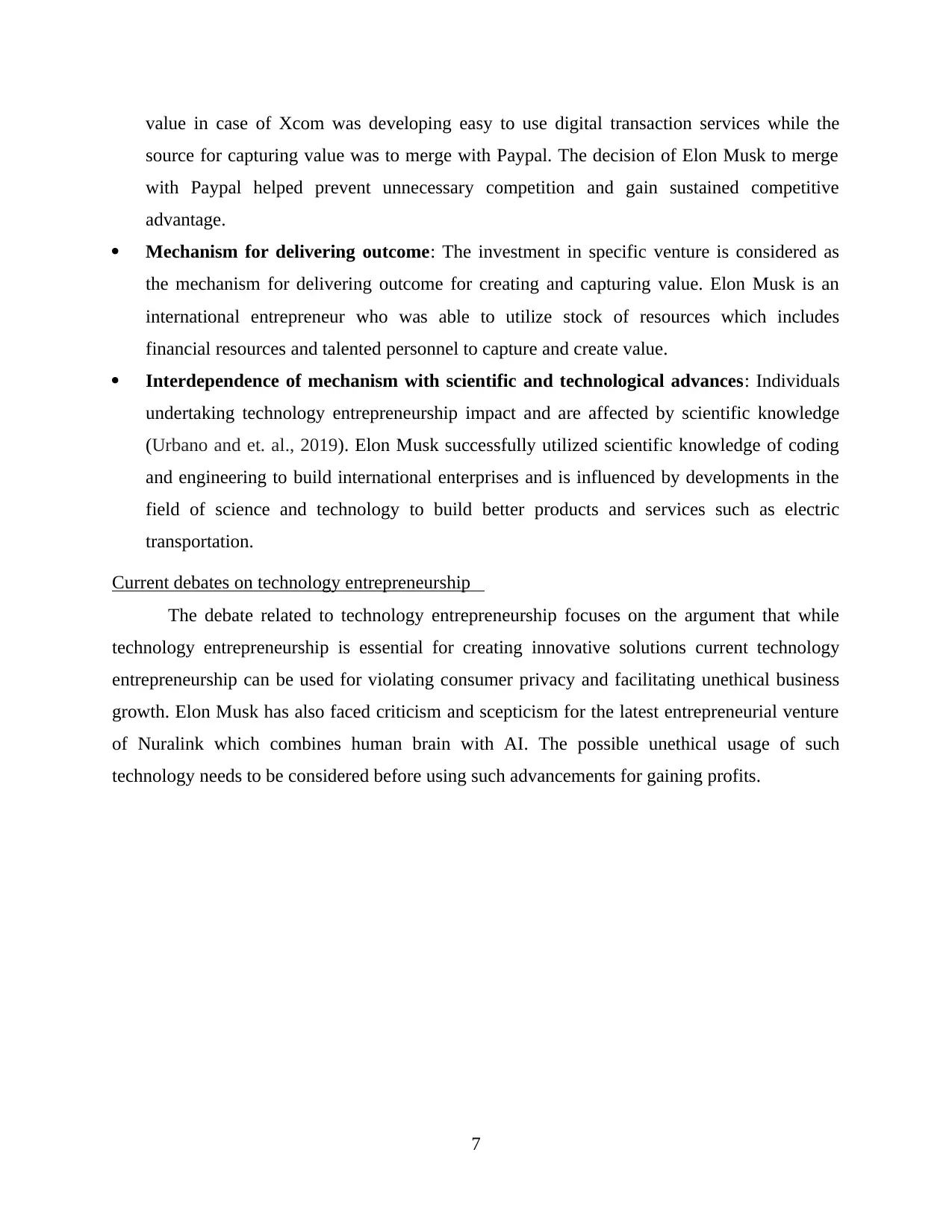
value in case of Xcom was developing easy to use digital transaction services while the
source for capturing value was to merge with Paypal. The decision of Elon Musk to merge
with Paypal helped prevent unnecessary competition and gain sustained competitive
advantage.
Mechanism for delivering outcome: The investment in specific venture is considered as
the mechanism for delivering outcome for creating and capturing value. Elon Musk is an
international entrepreneur who was able to utilize stock of resources which includes
financial resources and talented personnel to capture and create value.
Interdependence of mechanism with scientific and technological advances: Individuals
undertaking technology entrepreneurship impact and are affected by scientific knowledge
(Urbano and et. al., 2019). Elon Musk successfully utilized scientific knowledge of coding
and engineering to build international enterprises and is influenced by developments in the
field of science and technology to build better products and services such as electric
transportation.
Current debates on technology entrepreneurship
The debate related to technology entrepreneurship focuses on the argument that while
technology entrepreneurship is essential for creating innovative solutions current technology
entrepreneurship can be used for violating consumer privacy and facilitating unethical business
growth. Elon Musk has also faced criticism and scepticism for the latest entrepreneurial venture
of Nuralink which combines human brain with AI. The possible unethical usage of such
technology needs to be considered before using such advancements for gaining profits.
7
source for capturing value was to merge with Paypal. The decision of Elon Musk to merge
with Paypal helped prevent unnecessary competition and gain sustained competitive
advantage.
Mechanism for delivering outcome: The investment in specific venture is considered as
the mechanism for delivering outcome for creating and capturing value. Elon Musk is an
international entrepreneur who was able to utilize stock of resources which includes
financial resources and talented personnel to capture and create value.
Interdependence of mechanism with scientific and technological advances: Individuals
undertaking technology entrepreneurship impact and are affected by scientific knowledge
(Urbano and et. al., 2019). Elon Musk successfully utilized scientific knowledge of coding
and engineering to build international enterprises and is influenced by developments in the
field of science and technology to build better products and services such as electric
transportation.
Current debates on technology entrepreneurship
The debate related to technology entrepreneurship focuses on the argument that while
technology entrepreneurship is essential for creating innovative solutions current technology
entrepreneurship can be used for violating consumer privacy and facilitating unethical business
growth. Elon Musk has also faced criticism and scepticism for the latest entrepreneurial venture
of Nuralink which combines human brain with AI. The possible unethical usage of such
technology needs to be considered before using such advancements for gaining profits.
7
Paraphrase This Document
Need a fresh take? Get an instant paraphrase of this document with our AI Paraphraser
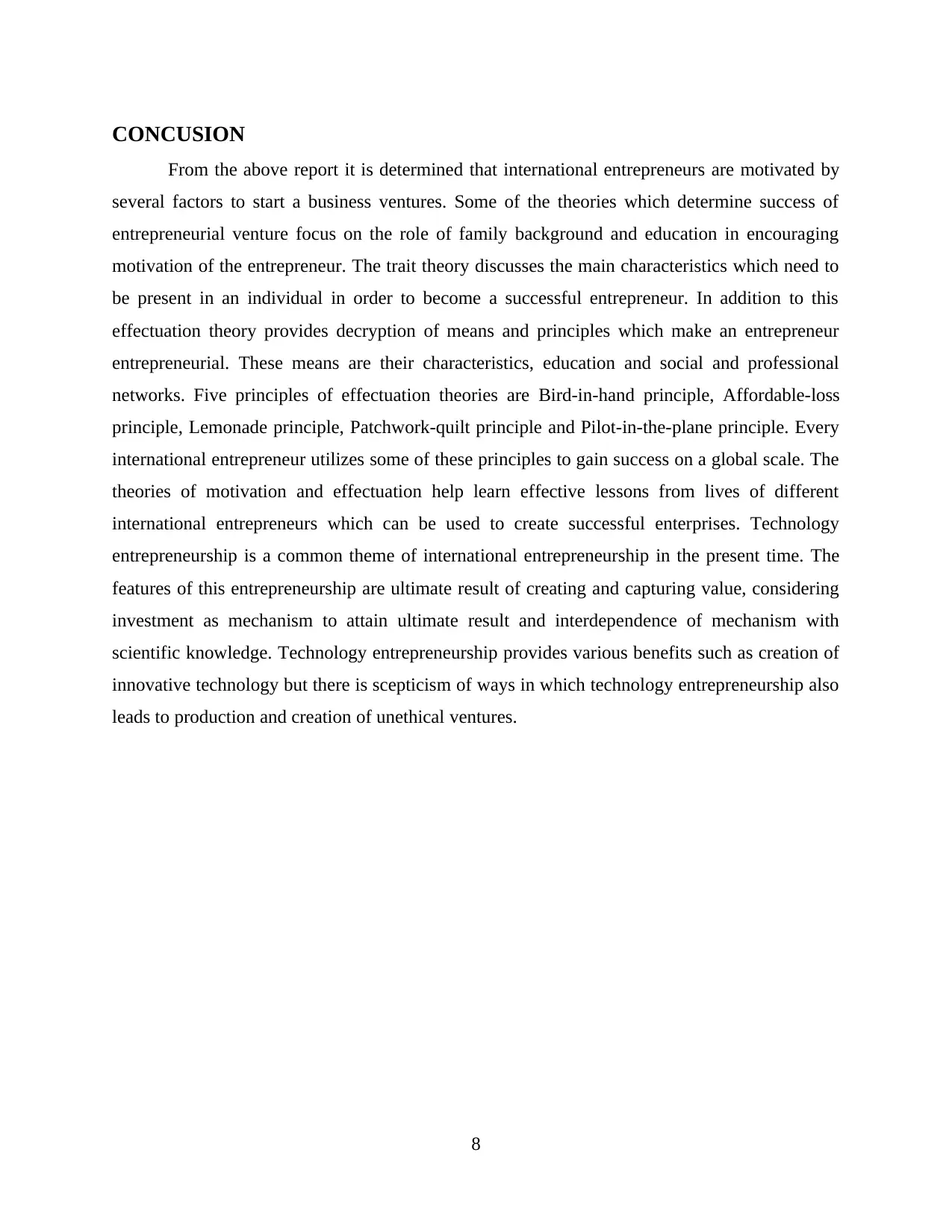
CONCUSION
From the above report it is determined that international entrepreneurs are motivated by
several factors to start a business ventures. Some of the theories which determine success of
entrepreneurial venture focus on the role of family background and education in encouraging
motivation of the entrepreneur. The trait theory discusses the main characteristics which need to
be present in an individual in order to become a successful entrepreneur. In addition to this
effectuation theory provides decryption of means and principles which make an entrepreneur
entrepreneurial. These means are their characteristics, education and social and professional
networks. Five principles of effectuation theories are Bird-in-hand principle, Affordable-loss
principle, Lemonade principle, Patchwork-quilt principle and Pilot-in-the-plane principle. Every
international entrepreneur utilizes some of these principles to gain success on a global scale. The
theories of motivation and effectuation help learn effective lessons from lives of different
international entrepreneurs which can be used to create successful enterprises. Technology
entrepreneurship is a common theme of international entrepreneurship in the present time. The
features of this entrepreneurship are ultimate result of creating and capturing value, considering
investment as mechanism to attain ultimate result and interdependence of mechanism with
scientific knowledge. Technology entrepreneurship provides various benefits such as creation of
innovative technology but there is scepticism of ways in which technology entrepreneurship also
leads to production and creation of unethical ventures.
8
From the above report it is determined that international entrepreneurs are motivated by
several factors to start a business ventures. Some of the theories which determine success of
entrepreneurial venture focus on the role of family background and education in encouraging
motivation of the entrepreneur. The trait theory discusses the main characteristics which need to
be present in an individual in order to become a successful entrepreneur. In addition to this
effectuation theory provides decryption of means and principles which make an entrepreneur
entrepreneurial. These means are their characteristics, education and social and professional
networks. Five principles of effectuation theories are Bird-in-hand principle, Affordable-loss
principle, Lemonade principle, Patchwork-quilt principle and Pilot-in-the-plane principle. Every
international entrepreneur utilizes some of these principles to gain success on a global scale. The
theories of motivation and effectuation help learn effective lessons from lives of different
international entrepreneurs which can be used to create successful enterprises. Technology
entrepreneurship is a common theme of international entrepreneurship in the present time. The
features of this entrepreneurship are ultimate result of creating and capturing value, considering
investment as mechanism to attain ultimate result and interdependence of mechanism with
scientific knowledge. Technology entrepreneurship provides various benefits such as creation of
innovative technology but there is scepticism of ways in which technology entrepreneurship also
leads to production and creation of unethical ventures.
8
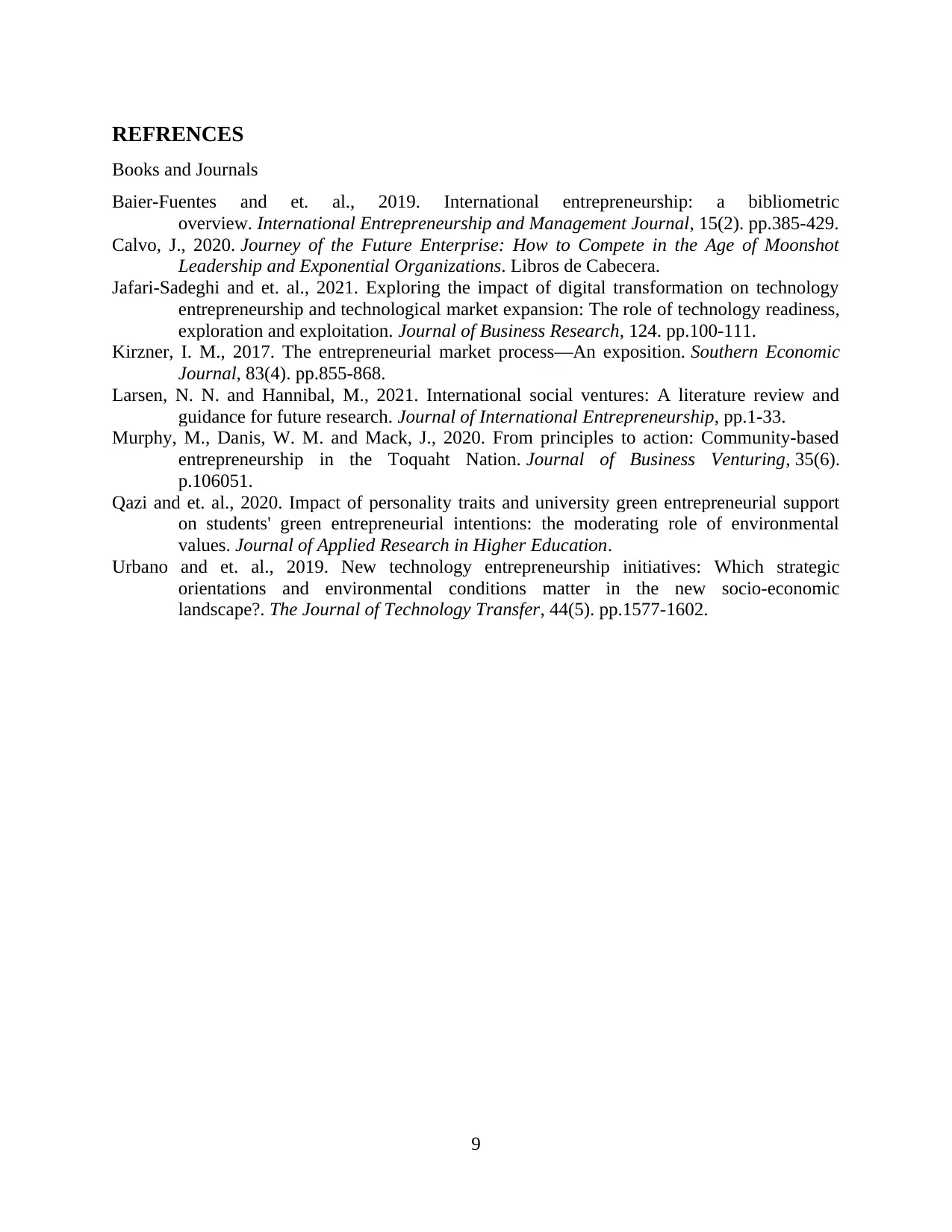
REFRENCES
Books and Journals
Baier-Fuentes and et. al., 2019. International entrepreneurship: a bibliometric
overview. International Entrepreneurship and Management Journal, 15(2). pp.385-429.
Calvo, J., 2020. Journey of the Future Enterprise: How to Compete in the Age of Moonshot
Leadership and Exponential Organizations. Libros de Cabecera.
Jafari-Sadeghi and et. al., 2021. Exploring the impact of digital transformation on technology
entrepreneurship and technological market expansion: The role of technology readiness,
exploration and exploitation. Journal of Business Research, 124. pp.100-111.
Kirzner, I. M., 2017. The entrepreneurial market process—An exposition. Southern Economic
Journal, 83(4). pp.855-868.
Larsen, N. N. and Hannibal, M., 2021. International social ventures: A literature review and
guidance for future research. Journal of International Entrepreneurship, pp.1-33.
Murphy, M., Danis, W. M. and Mack, J., 2020. From principles to action: Community-based
entrepreneurship in the Toquaht Nation. Journal of Business Venturing, 35(6).
p.106051.
Qazi and et. al., 2020. Impact of personality traits and university green entrepreneurial support
on students' green entrepreneurial intentions: the moderating role of environmental
values. Journal of Applied Research in Higher Education.
Urbano and et. al., 2019. New technology entrepreneurship initiatives: Which strategic
orientations and environmental conditions matter in the new socio-economic
landscape?. The Journal of Technology Transfer, 44(5). pp.1577-1602.
9
Books and Journals
Baier-Fuentes and et. al., 2019. International entrepreneurship: a bibliometric
overview. International Entrepreneurship and Management Journal, 15(2). pp.385-429.
Calvo, J., 2020. Journey of the Future Enterprise: How to Compete in the Age of Moonshot
Leadership and Exponential Organizations. Libros de Cabecera.
Jafari-Sadeghi and et. al., 2021. Exploring the impact of digital transformation on technology
entrepreneurship and technological market expansion: The role of technology readiness,
exploration and exploitation. Journal of Business Research, 124. pp.100-111.
Kirzner, I. M., 2017. The entrepreneurial market process—An exposition. Southern Economic
Journal, 83(4). pp.855-868.
Larsen, N. N. and Hannibal, M., 2021. International social ventures: A literature review and
guidance for future research. Journal of International Entrepreneurship, pp.1-33.
Murphy, M., Danis, W. M. and Mack, J., 2020. From principles to action: Community-based
entrepreneurship in the Toquaht Nation. Journal of Business Venturing, 35(6).
p.106051.
Qazi and et. al., 2020. Impact of personality traits and university green entrepreneurial support
on students' green entrepreneurial intentions: the moderating role of environmental
values. Journal of Applied Research in Higher Education.
Urbano and et. al., 2019. New technology entrepreneurship initiatives: Which strategic
orientations and environmental conditions matter in the new socio-economic
landscape?. The Journal of Technology Transfer, 44(5). pp.1577-1602.
9
⊘ This is a preview!⊘
Do you want full access?
Subscribe today to unlock all pages.

Trusted by 1+ million students worldwide
1 out of 9
Related Documents
Your All-in-One AI-Powered Toolkit for Academic Success.
+13062052269
info@desklib.com
Available 24*7 on WhatsApp / Email
![[object Object]](/_next/static/media/star-bottom.7253800d.svg)
Unlock your academic potential
Copyright © 2020–2026 A2Z Services. All Rights Reserved. Developed and managed by ZUCOL.




